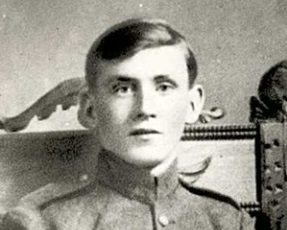Private Michael Joseph Dunne the maternal grandfather of Canadian actor/writer/director Paul Gross. Dunne the basis for the 2008 film Passchendaele, written, directed, produced and starring Paul Gross in a role loosely based on his grandfather’s experiences in the Great War.
Enlistment of Private Michael Joseph Dunne
Michael Joseph Dunne a Farmer, born 28 February 1887 in Ballyraggan, Ireland. Living at Brooks Station, Alberta. Private Michael Dunne 447977 attested 8 January 1916 in Calgary with the 56th Overseas Battalion, CEF, standing 5′ 7 1/2″ tall, with fair complexion, blue eyes and dark brown hair.
56th Overseas Battalion
Organized in April 1915 under the command of Lieutenant-Colonel William Charles Gordon Armstrong. Mobilized at Calgary and also recruited in Calgary. Drafts of 5 officers and 250 other ranks sent to England in June and Septsember 1915.

Prior to departure, Michael forfeits two days pay. The 56th Battalion embarked from Halifax 23 March 1916 aboard SS BALTIC, and later disembarked in England 8 April 1916 with a strength of 40 officers, 1070 other ranks. Draft of 230 to 9th Canadian Reserve Battalion in July 1916. Later absorbed by 9th Canadian Reserve Battalion 4 January 1917.

A particularly long voyage, Private Michael Joseph Dunne arrived overseas on 8 April 1916.
France
Pte Michael Joseph Dunne entered Western Front on 26 May 1916 with the 5th Battalion, but immediately SoS to the 14th Battalion.
14th Canadian Infantry Battalion
Organized in Valcartier Camp in September 1914 composed of recruits from Montreal, and initially commanded by Lieutenant-Colonel Frank Stephen Meighen.


The 14th Battalion embarked from Quebec 30 September 1914 aboard ALAUNIA and ANDANIA with the Canadian First Contingent. Later disembarked England 16 October 1914 with a strength of 46 officers, 1101 other ranks. Disembarked in France 10 February 1915 with the 1st Canadian Division, 3rd Canadian Infantry Brigade, and later reinforced by 23rd Canadian Reserve Battalion.
9 June 1916
GOC of the first Division, General A W Currie visited and addressed the battalion.

Battle of Mount Sorrel
With the Battalion in Divisional Reserve, Michael one of the few supplied to working parties in the counterattack at Mount Sorrel on 11 June 1916.

First Wound Stripe
In the Battle of Mount Sorrel debacle, Michael first reported wounded, but remained at duty. Then reported missing on the night of 12/13 June 1916.

Michael eventually found his way through the lines and back to his unit on 17 June 1916.
Battle of the Somme – Mouquet Farm
On the night of 6 September 1916 Hon Major John O’Gorman, the RC Chaplin of the Battalion seriously wounded in No Man’s Land tending to wounded by Mouquet Farm. O’Gorman supposedly awarded the MC for this action (Mentioned in Despatches, LG 31448, 11 July 1919, Officer of the Most Excellent Order of the British Empire).

Second Wound Stripe
Dunne wounded shortly afterwards on 7 September 1916, GSW left thigh, buttock, left hand, and left shoulder.
No. 10 General Hospital, Rouen, 9 September 1916.
Return to England
While recovering from his wounds, Michael developed appendicitis. Admitted to Balham Red Cross Hospital on 21 September 1916 (appendix removed). Trànsfered to Willingham Convalescent Hospital, 6 December 1916, and finally discharged 11 January 1917.

Battle of Vimy Ridge
After the Battle for Vimy Ridge, Dunne part of a patrol mopping up through a ruined village when they encountered a machine-gun nest. The patrol and the nest exchanged fire for many hours until everyone in his patrol dead or wounded except him, and the machine gun quiet. Dunne fixed his bayonet and charged the nest to discover one young German soldier still alive, blood seeping from his many wounds.

“He had these blue eyes, these watery blue eyes,” said the old man. The young German raised his hand, and said, “Kamerad.” The old man told me he looked at him for a second, then bayoneted him in the forehead. “I wasn’t angry, I wasn’t frightened — I just killed him,” he said.

Tonsilitis
Dunne admitted to No. 12 Canadian Field Ambulance, Tonsilitis, 20 December 1917. Transferred to Convalescent Depot, Etaples, 9 January 1918, and later to Convalescent Depot, Trouville, 12 January 1918.
Battle of Amiens
Third Wound Stripe
Wounded during the first few days of the Battle of Amiens – GSW neck, face and knee. Michael felled by a plethora of shell splinter’s. His wounds too severe – his days at the front over.

Final Return to England
By 14 August 1918 Miahcel at 1st London General Hospital. No. 16 Canadian General Hospital, Orpington, 24 August 1918, later discharged on 24 September 1918.

Tinnitus, headaches, 17 November 1918 at Bramshott Camp.
ToS District Depot No. 13 on 22 November 1918.
Return to Canada
Private Michael Joseph Dunne returned per HMT AQUITANIA, Halifax, 28 November 1918. Granted leave with subsistence, to 23 December 1918.

SoS District Depot No. 13 on 24 January 1919. Date of discharge 24 January 1919.
Michael Joseph Dunne later worked for the CPR.
Death of Michael Joseph Dunne
Dunne’s grandson, Paul Gross later said he was muttering for forgiveness on his deathbed, and that he was the only one who knew what was being talked about.

Over and over he was saying, “I’m sorry.” And I know, in my bones I know, he was trying to apologize to the boy he’d bayoneted.
Grandson Paul Gross
More
- Blog
- CEFRG on FaceBook
- CEFRG on YouTube
- Soldiers and Nursing Sisters
- Units (Brigades, Battalions, Companies)
- War Diary of the 18th Battalion (Blog)
- 116th Battalion CEF – The Great War
- Les Soldats du Québec Morts en Service
- Montreal Aviation Museum
- Battles of the Great War
- Cases
- Cemeteries
- Memorials
- On This Day
- About CEFRG





